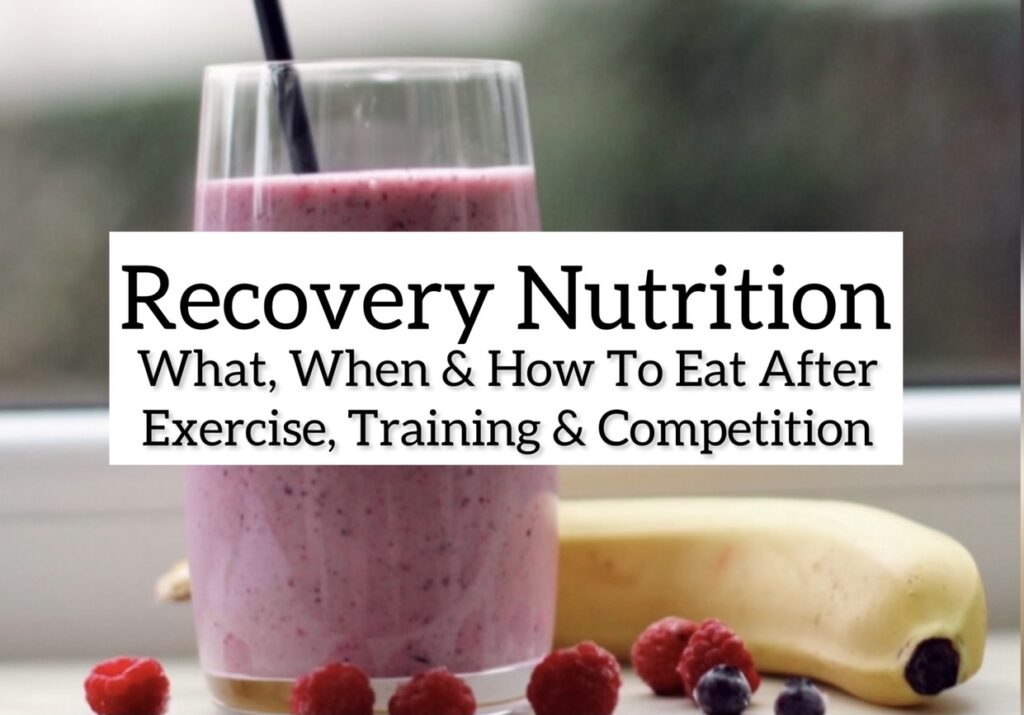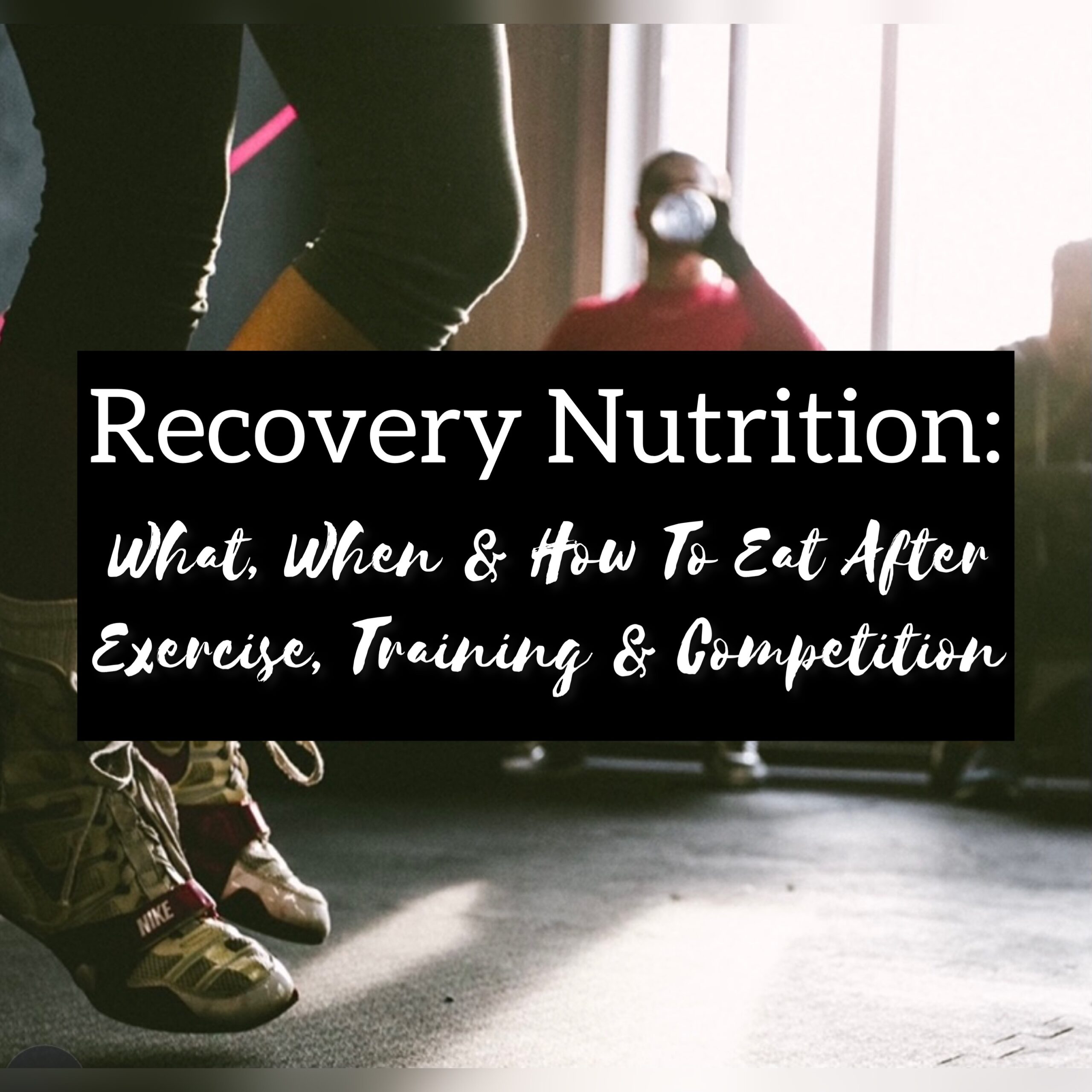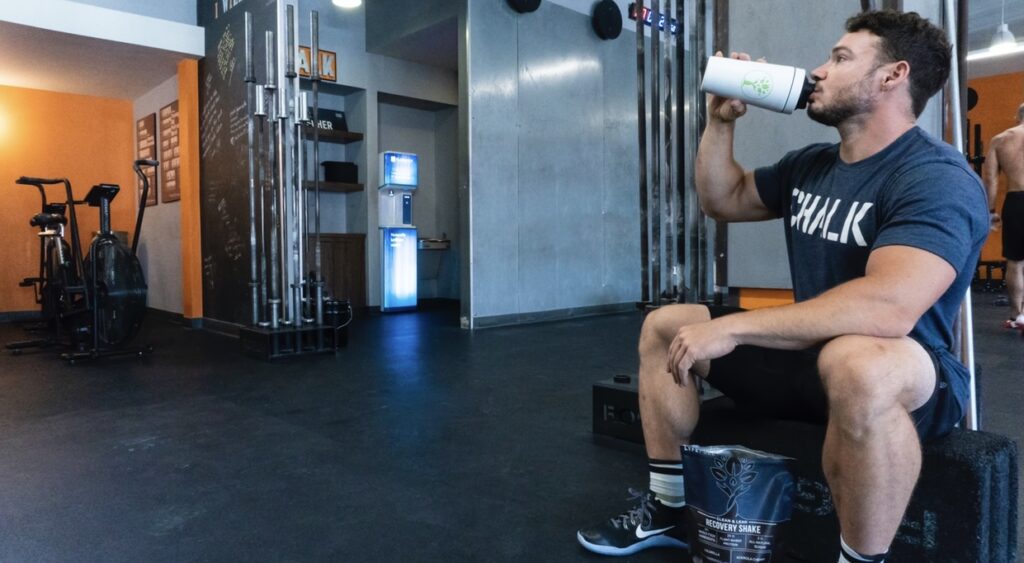Recovery nutrition is an important part of an athlete’s sports nutrition plan, but what and how much food you eat matters. Here’s everything you need to know about eating after exercise.

Most athletes understand the purpose of eating before exercise. The nutrients from your pre-event meal or snack provide fuel for your training or competition. But, what about the importance of eating after activity? From my experience as a sports dietitian, the purpose of recovery nutrition is not as understand. Don’t get me wrong, most of my clients have heard they need to eat something after training. I just find they don’t understand the purpose, or what and how much food to eat. To understand what makes an ideal recovery snack, you have to first understand what is happening in the body after exercise and how what you eat (or don’t eat) can influence how you recover.
What Is Recovery Nutrition
Recovery nutrition is the term used to describes the food an athletes eats after exercise. There are three main goals of recovery nutrition. One is to replenish the liver and muscle glycogen stores that were used or depleted during activity. The second is to rehydrate with fluids and replace the electrolytes that were lost in sweat. The third is to support the growth and repair of muscle tissue that was stimulated during exercise.
“To help remember the purpose of recovery nutrition, remember the 3 R’s:
“Replenish, Rehydrate, Rebuild”
Do All Athletes Need A Post-Exercise Recovery Snack?
Over the years, recovery nutrition has become one of the most common terms and practices in the sports nutrition world. Rarely do I meet an athlete that hasn’t heard the term. Most sports supplement companies have special products marketed specifically for consumption after activity. Even child athletes, as young as 5 and 6 years old, are handed a snack bag after a 45 minute game of recreational soccer – even if they hardly ran on the field. Though recovery nutrition is a popular term, the purpose of eating after exercise seems to have gotten lost in the hype.
Post-exercise nutrition is extremely important for competitive athletes, but not all active people need a recovery snack or meal. Athletes training at low-intensity, such as a 30-minute walk, don’t require special recovery recommendations. Children participating in a 45 minute to 1 hour recreational sport do not typically need a recovery nutrition snack, either. At that level, the best way to get nourishment is to go home and eat a well-balanced meal.
On the other hand, athletes that engage in strenuous, exhaustive training, have multiple training sessions or competitions in the same day, or are trying to change body composition, may benefit from a recovery meal or snack.
How Soon After Exercise Should You Eat?
For years, recovery nutrition recommendations were based on eating the recovery meal or snack within 30-45 minutes of finishing activity. That recommendation came after sports science researchers discovered that skeletal muscle sensitivity is heightened after strenuous activity and that muscles are able to take up and metabolize nutrients more readily within that time frame. The 30-45 minutes after activity became referred to as the “anabolic window” and turned out to be a significant part of meal timing recommendations for athletes.
Replenishing glycogen stores quickly is important in some situations, but it’s not necessary for all athletes, all of the time. For day to day training sessions lasting ~1 hour, when there isn’t another training or competition happening in that same day, there is no urgent need to replenish muscle fuel. Eating a well-balanced meal or snack within 2 hours is adequate to promote muscle recovery. For other athletes, though, the best time to eat for recovery is immediately after exhaustive activity, or within the 30-45 minute window.
Who Needs Recovery Nutrition?
Eating a recovery snack/meal within the 30-45 minute window is meant to quickly replenish muscle and liver glycogen after an exercise session. The key word there being “quickly.” Restoring muscle fuel quickly is important for athletes that have another training or competitive event planned in that same day. That’s because, they will need that fuel to provide energy for their next event or activity.
Recovery nutrition is also important for novice, competitive athletes who are trying to improve performance. Remember that glycogen is stored in muscles. The more muscle mass an athlete has, the more glycogen they are likely capable of storing. Research shows that well-trained athletes have a greater glycogen storage capacity than novice or less trained athletes.
Another group of athletes that can benefit from eating a recovery snack or meal immediately after exercise are those trying to increase muscle mass, or gain weight in general. That’s because consuming enough calories, carbohydrates and protein in a day can be a challenge. Especially for athletes that work long hours, or adolescent athletes that are in school all day then train and/or compete in the evenings. Having a small or large snack as soon as activity is finished is another opportunity to get the nutrients needed for weight gain.
What To Eat After Exercise: Carbohydrates, Protein & Fluids
One of the biggest misconceptions is that large amounts of protein are needed after exercise. Despite popular believe, the most important nutrient to include in your recovery meal or snack is carbohydrate. They play a much bigger role in recovery than most athletes realize. Protein is important too, but it’s not more important that carbohydrates.
Carbohydrate rich foods help to replenish glycogen – the muscle fuel that was used during activity. Protein helps to stimulate muscle protein synthesis and spare protein breakdown. But here’s the catch – your muscles will not use protein to build and repair if they don’t first have enough energy (fuel.) That fuel comes from carbohydrates.
Once your muscle glycogen stores have been replenished, the next important piece of recovery can begin- the rebuilding of muscle tissue. That’s where high-quality protein comes into play. Protein rich foods provide the amino acids essential to repair muscle tissue after strenuous exercise. Laboratory based studies show that muscle protein synthesis is optimized in response to exercise when high-biological protein is consumed.
Adequate refueling with carbohydrates and protein in the immediate post-workout period may support glycogen restoration and muscle protein synthesis and repair. Not to mention, overall energy.
Lastly, don’t forget fluids and electrolytes. Rehydrating after activity is a critical part of recovery.
What Should You Not Eat After-Exercise?
If you are finished with training and competition for the day, and don’t have another strenuous session planned the next morning, there really isn’t any food that you can’t eat. Eat a well-balanced meal or snack that provides carbohydrates, protein, some dietary fats and a wide variety of vitamins and minerals. Basically, eat a balanced, nutritious meal.
On the other hand, athletes that have another training session or competitive event the same day, especially if it’s within the couple of hours, should watch the amount of dietary fat they consume. The recommendation to limit fat as part of the recovery meal serves a few purposes. For one, eating too much fat can slow down the digestion, absorption and metabolism of the carbohydrates and protein you eat with the meal.
Fat also promotes feeling of fullness, which can get in the way of eating enough carbohydrates and protein. Since the goal of recovery nutrition is rapid repletion of glycogen, you want to limit anything that slows down that process.
Post-training protein shakes are a popular choice among athletes. If that’s what you prefer, just make sure to include enough carbohydrate to recover properly.
How Much Carbohydrate, Protein And Fluid Should A Recovery Snack Include?
Nutrition advice gets pretty precise for competitive athletes. Current recommendations suggest that the recovery meal include between 1.0- 1.2 grams of carbohydrates per kilogram of body weight. That means, a 120 pound (55 kilogram) athlete should consume between 55- 65 grams of carbohydrate as part of his/her recovery meal. A 200 pound (91 kilogram) athlete should consume between 91- 109 grams of carbohydrate. Though recommendations are based on body weight, the amount of carbohydrate consumed for recovery should consider the intensity and duration of your workout, as well as your personal goals.
Unlike carbohydrate, the amount of protein recommended as part of the recovery meal is not based on body weight. It is based on total grams and is the same for athletes all different types of athletes. In addition to the carbohydrates, the recovery meal should include between 15 -25 grams of protein.
Last but definitely not least, is rehydration. Most athletes finish training with a fluid deficit requiring a significant amount of fluid to restore fluid balance. The recommendation is to consume 16-24 ounces of fluid for every pound lost during exercise. That works great for athletes that weigh themselves before and after activity, and know how much weight they lost. But, weighing before and after isn’t always possible. As a general guideline, drink a minimum of 2-3 cups of fluid in the first 30-45 minutes after exercise. Heavy sweaters will likely need more.
In addition to fluid, it’s important to also replenish electrolytes. An easy way to get both is by drinking an electrolyte replacement beverage or a sport drink. If you prefer to drink water, incorporate some sodium rich foods into your snack or meal. Below is an example of how to calculate the carbohydrate needs of an athlete based on body weight.
Example of Recovery Snack/Meal Size Based on Body Weight
| Carbohydrates (1-1.2 g/kg) | Protein (15-25 grams) | Fluid (16-24 oz per pound lost) | Recovery Snack Example | |
| 120 Ibs. (55 kg) athlete | 55-65 grams | 15-25 grams | varies, at least 2-3 cups of fluid | 2 slices of bread , 3-4 ounces of turkey breast, 8 ounces of orange juice + 2 cups water |
| 150 Ibs. (68 kg) athlete | 68- 82 grams | 15-25 grams | varies, at least 2-3 cups of fluid | 2 slices of bread, 3-4 ounces of turkey breast, 1 ounce of pretzels, 8 ounces of orange juice + 2 cups water |
| 200 Ibs (91 kg) athlete | 91-109 grams | 15-25 grams | varies, at least 3-4 cups of fluid | 2 slices of bread, 3-4 ounces turkey breast, 2 ounce of pretzels, 8 ounces of orange juice + 2 cups water |
*1 pound = 2.2 kilograms
The above estimates can be used for a guide, but it’s not necessary for all athletes to be so specific. The intensity, duration, type of activity and level of training all play a role in how much glycogen was used to fuel your workout. While some athletes will benefit from rushing to the recovery station, another would be fine waiting until their next balanced meal. Rather than getting caught up in the calculation, keep it simple and focus on pairing a protein and a carbohydrate together along with fluid. Then, be sure to get a well-balanced meal within 3-4 hours of finishing your activity.
Examples of Foods To Eat For Recovery
The recovery meal should include carbohydrates, protein and fluid. But, the amount you eat and drink will vary from one athlete to another. If you are taking snacks and meals for a long day of competition, make sure to have a quality cooler and some ice packs to keep cold foods cold. Take a variety of shelf-stable foods that you can pair together to make a high-quality recovery meal.
A sandwich with juice and pretzels, as I showed in the example above, is a great recovery meal. You could also make a balanced smoothie or shake or make a yogurt bowl with Greek yogurt with granola and fruit. If it will be an hour or two until you eat, have 8-12 ounces of chocolate milk immediately after activity to start the recovery process, then get the remained of your nutrition from a balanced meal once you are home.
Read why chocolate milk makes great recovery fuel.
For some balanced snack ideas, check out my article, Ten Snack Ideas For Athletes or Ten Snacks With 25-30 Grams Of Protein



 Hi, I’m Heather – a registered dietitian, busy mom, consultant, adventure junkie and travel addict who has mastered living healthy on the go. My blog is where I share simple recipes and healthy living tips to help and inspire others to live their best life.
Hi, I’m Heather – a registered dietitian, busy mom, consultant, adventure junkie and travel addict who has mastered living healthy on the go. My blog is where I share simple recipes and healthy living tips to help and inspire others to live their best life.
Great read!
Thank you, Michelle.
Really awesome article. You have written everything in very detail. I am taking AppetiteMax pills to gain weight because these pills really helped my friend to gain weight. Can you tell me that is it safe to take these pills or not?